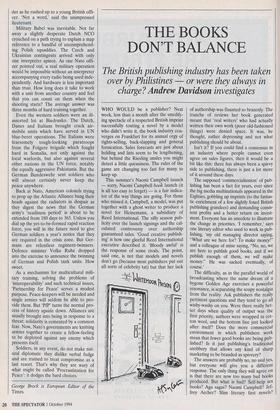THE BOOKS DON'T BALANCE
The British publishing industry has been taken over by Philistines — or were they always in
WHO WOULD be a publisher? Next week, less than a month after the unedify- ing spectacle of a respected British imprint successfully touting a novel by a model who didn't write it, the book industry con- verges on Frankfurt for its annual orgy of rights-selling, back-slapping and general fornication. Sales forecasts are just about holding and lists seem to be lengthening, but behind the Riesling smiles you might detect a little queasiness. The rules of the game are changing too fast for many to keep up.
This summer's Naomi Campbell launch — sorry, Naomi Campbell book launch (it is all too easy to forget) — is a fair indica- tor of the way \things are going. For those who missed it, Campbell, a model, was put together with a ghost writer to produce a novel for Heinemann, a subsidiary of Reed International. The silly season pub- licity over the launch signings and the cal- culated controversy over authorship guaranteed sales. `Good creative publish- ing' is how one gleeful Reed International executive described it. 'Bloody awful' is the response of some rivals. The point, said one, is not that models and novels don't go (because most publishers put out all sorts of celebrity 'tat) but that her lack of authorship was flaunted so brazenly. The tranche of reviews her book generated meant that 'real writers' who had actually written their own work (poor old-fashioned things) were denied space. It was, he thought, rather depressing and not what publishing should be about.
Isn't it? If you could find a consensus in an industry where people cannot even agree on sales figures, then it would be a bit like this: there has always been a spivvy side to publishing, there is just a lot more of it around these days.
The supposed `commercialisation' of pub- lishing has been a fact for years, ever since the big media multinationals appeared in the Eighties, gobbling up imprints (to the fantas- tic enrichment of a few slightly foxed British publishing grandees) and demanding consis- tent profits and a better return on invest- ment. Everyone has an anecdote to illustrate the change in priorities. 'I remember,' says one literary editor who used to work in pub- lishing, 'my old managing director saying, "What are we here for? To make money!" and a colleague of mine saying, "No, no, we are here to publish good books, and if we publish enough of them, we will make money." He was sacked eventually, of course.'
The difficulty, as in the parallel world of broadcasting where the same dream of a bygone Golden Age exercises a powerful resonance, is separating the soupy nostalgia from the reality. Ask publishers the really pertinent questions and they tend to go all wishy-washy on you. Were there really bet- ter days when quality of output was the first priority, authors were wrapped in cot- ton wool, and the bottom line just looked after itself? Does the more commercial environment in which publishers work mean that fewer good books are being pub- lished? Is it just publishing's traditional snobbery that allows any kind of sharp marketing to be branded as spiwery?
The answers are probably no, no and yes, but everyone will give you a different response. The only thing they will agree on is that there are now too many bad books produced. But what is bad? Self-help sex books? Aga sagas? Naomi Campbell? Jef- frey Archer? Slim literary first novels? Books that don't sell? Just as in television, there is the same pin-dancing debate about whether popular means good, or bad, or has nothing to do with issues of quality at all.
For the old guard, it is clear-cut. The industry is being taken over by young Turks (or, to be more geographically accu- rate, Philistines) who are less interested in reading books than selling them, and for whom the term 'literary' is a dirty word. They are now driven by an Orwellian marketspeak: low sales = small audience = bad; big sales = popular = good. But being less erudite, they make bad editors (and bad agents) and hence the quality of books has slipped. So in desperation they are pushing more titles onto the market.
Over 80,000 new titles — just imagine it — were published last year, of which around 30,000 are general consumer books (the rest are specialist titles like booklets and monographs). Yet only about one in four makes any money. For some it looks like a slap-it-on-and-see-what-sticks tech- nique. But whose fault is it? One young publisher told me the problem is not the new values but the old — you cannot keep producing books that people won't buy. `There is still a generation we need to get rid of in this industry,' he added ominously.
So far writers have been protected from the wrangling. Most publishers still treat their run-of-the-mill authors pretty well, especially when considering that the aver- age literary novel, outside the big league, rarely sells more than a thousand in hard- back. But that may change. The old theory that 'good' writers would initially be sup- ported through lean times before the pub- lic catches up is already being replaced by a harder-hitting pragmatism: two shots and you're out, perhaps. Those who are slow to warm up (an example is Tom Sharpe, whose first two novels were pulped after disappointing sales) might not get a chance in future. The likely squeeze on small Independent bookshops if the Net Book Agreement is removed — as seems more likely than ever — and the development of speedy Electronic Point of Sale (EPOS) data means the big will get bigger and the small won't get read. For the doom-mon- gers, that means writers like Jeffrey Archer and John Grisham, currently the fastest- selling author in the world, will simply clean up at the expense of more refined talent that cannot get on the shelves. This will be fine for publishers if they can keep the big hitters coming; but if you don't nurture the talent, where are they going to come from? The public can easily tire of popular authors, as the rumoured slide in sales of writers like Jackie Collins and Jack Higgins shows. Publishers think ---- or pretend to — that they can always create another star. In fact, they are much less in control of their market-place than they would have anyone believe. This is exemplified by the rise of the ludicrous advance. Rupert Murdoch's HarperCollins is rumoured to have paid Jeffrey Archer something up to £20 million for his next three books; Random House is believed to have paid up to £10 million for Ken Fol- lett's next three in America. Though pub- lishers insist they can make profits on such figures (when someone like Archer sells half a million hardback in the US and the UK, 2 to 3 million in paperback and then 100,000 a year on your backlist, he is going to ask for a lot of money), others are doubtful.
`They just have to feed the machine,' says one publisher. In other words, once you have gobbled up everyone else and have your own printers, warehouses and distribution outfits carrying very large overheads, you desperately need the big hitters just to keep your system ticking over. The more mischievous whisper is that to afford their ludicrous advances many publishers are relying on the boom in educational publishing. Perhaps the jet- set life of the average household-name novelist is supported by the average inner- city comprehensive. 'No, no, no,' says one chairman when I put it to him, 'it just doesn't work like that.' Others say it does.
The problem, perhaps, is that the new commercial demands have made many publishers genuinely confused, one minute wanting to be seen as nurturers of fine writing, the next as demon marketers. It is never more clearly demonstrated than by the Booker, the prestige literary prize and marketing event designed to get people into bookshops and to read authors they wouldn't otherwise have heard of. This year it has served half its purpose, as most of the public had never heard of any of the authors on the short list. But nor is anyone buying them. 'Retailers say it's a disastrous list, it's a self-parody,' moans one publish- er. The trouble with retailers,' says another pointedly, 'is that they want Roddy Doyle on the list every year, and Roddy Doyle winning every year . . . '
Or more Madonna books, or more Naomi Campbell. Now that the barrier between fact and fiction is truly blurred, the marketing can really start. The phan- tom that stalks the industry is that the more resources it puts behind 'manufac- tured' one-off hits — Campbell's novel is believed to have had a publicity budget alone of over £100,000 — the less there is for others. And the faster the money-go- round spins, the more you have to pay each time to make the hit.
You just sit and hope that, once in a while, a Peter Mayle or Stephen Hawking will emerge from left-field and drop into your lap to fund everything else. Who would have thought there was a market for the maudlin meanderings of an ex-adman in France? Who would have believed a dense book embracing physics and philoso- phy (which no one ever finishes) would sell hundreds of thousands? Who would be a publisher?



























































 Previous page
Previous page